
An excellent talking point for your greenhouse or conservatory is the delightfully, well accurately, named Scurvy grass, Cochlearia officinalis. Here the clue definitely lies in the names. The spoon shaped (Cochlear in Greek) leaves deliver massive doses of Vitamin C and really can cure Scurvy (a skin disease caused by the lack of this Vitamin). So this plant is a must have for survivalist gardeners, luckily it can be grown in large pots on a windowsill at a push.
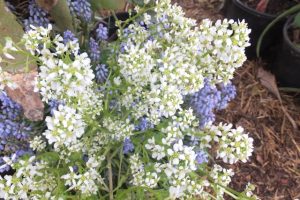
The glossy foliage much resembles Watercress, indeed I reckon anyone could easily confuse the two. However Scurvy grass likes just moist soil and not running water so is the more suited growing in containers. The white flowers also resemble those of watercress, oddly scented and in profusion. These should be dead-headed to boost foliage and not waste energy on seed.
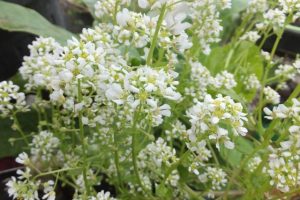
This plant likes cool shade and some tubs are excellent fillers in shady spots and as ‘greenery’ for low down in large displays. Being a native of maritime areas Scurvy grass is near hardy however the quality and decorative effect of the foliage is soon spoilt by weather so it’s really best kept permanently under cover.
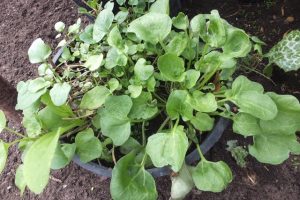
Easy from seed, this is perennial though better replaced every few years with new. Ideally sow direct, sparingly, in the tubs these are to stay in. Though you can start these in small pots if moved to larger tubs sooner than later. A nutrient-poor sandy gravelly compost is preferable as you do not want rank growth. Thin plants to a hand width or so apart. Keep moist and never waterlogged, and seldom feed though you can add a little salt instead occasionally.
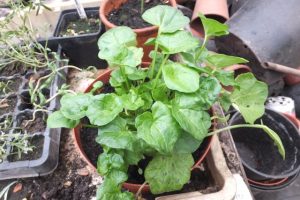
Molluscs, and sometimes aphids, are the only likely problems otherwise these are care-free plants. When picking nip the whole leafstalk with the leaf, it’s as nutritious and would only dieback and look ugly left hanging on the plant.
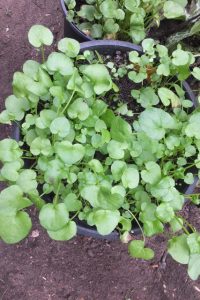
Although Scurvy grass can be eaten fresh like cress or rocket it’s very ‘hot’ so not much will be readily consumed. Again the clue is in the name, very closely related is C. armoracia, Horseradish, which is also hot and both are much like Wasabi the Japanese ‘mustard’. So perhaps if wanted for the health benefit more might be gulped down in a smoothy than when tossed in a salad.










